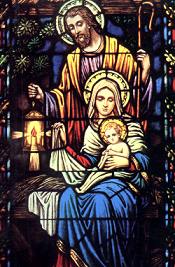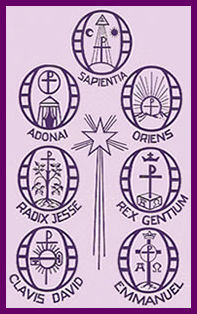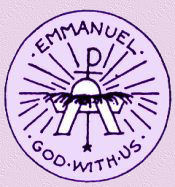Advent: December 24th
Christmas Eve
Old Calendar: Vigil of the Nativity of Our Lord
+Hail and blessed be the hour and moment in which the Son of God was born of the most pure Virgin Mary, at midnight, in Bethlehem, in piercing cold. In that hour vouchsafe, O my God! to hear my prayer and grant my desires, through the merits of Our Saviour Jesus Christ, and of His blessed Mother. Amen.
In the General Roman Calendar, this date is the last day of Advent, Christmas Eve, and also (beginning with the vigil Mass) is the first day of Christmas time. The liturgical texts express wholehearted confidence in the imminent coming of the Redeemer. There is much joyous expectation. Most families have their own observances, customs that should be preserved from generation to generation. Today is the last day of our Christmas Novena.
Christmas Eve at Church The entire liturgy of Christmas Eve is consecrated to the anticipation of the certain and sure arrival of the Savior: "Today you shall know that the Lord shall come and tomorrow you shall see His glory" (Invitatory of Matins for the Vigil of the Nativity). Throughout Advent we have seen how the preparation for Jesus' coming became more and more precise. Isaiah, John the Baptist and the Virgin Mother appeared throughout the season announcing and foretelling the coming of the King. We learn today that Christ according to His human nature is born at Bethlehem of the House of David of the Virgin Mary, and that according to His divine nature He is conceived of the Spirit of holiness, the Son of God and the Second Person of the Trinity.
The entire liturgy of Christmas Eve is consecrated to the anticipation of the certain and sure arrival of the Savior: "Today you shall know that the Lord shall come and tomorrow you shall see His glory" (Invitatory of Matins for the Vigil of the Nativity). Throughout Advent we have seen how the preparation for Jesus' coming became more and more precise. Isaiah, John the Baptist and the Virgin Mother appeared throughout the season announcing and foretelling the coming of the King. We learn today that Christ according to His human nature is born at Bethlehem of the House of David of the Virgin Mary, and that according to His divine nature He is conceived of the Spirit of holiness, the Son of God and the Second Person of the Trinity.
 The entire liturgy of Christmas Eve is consecrated to the anticipation of the certain and sure arrival of the Savior: "Today you shall know that the Lord shall come and tomorrow you shall see His glory" (Invitatory of Matins for the Vigil of the Nativity). Throughout Advent we have seen how the preparation for Jesus' coming became more and more precise. Isaiah, John the Baptist and the Virgin Mother appeared throughout the season announcing and foretelling the coming of the King. We learn today that Christ according to His human nature is born at Bethlehem of the House of David of the Virgin Mary, and that according to His divine nature He is conceived of the Spirit of holiness, the Son of God and the Second Person of the Trinity.
The entire liturgy of Christmas Eve is consecrated to the anticipation of the certain and sure arrival of the Savior: "Today you shall know that the Lord shall come and tomorrow you shall see His glory" (Invitatory of Matins for the Vigil of the Nativity). Throughout Advent we have seen how the preparation for Jesus' coming became more and more precise. Isaiah, John the Baptist and the Virgin Mother appeared throughout the season announcing and foretelling the coming of the King. We learn today that Christ according to His human nature is born at Bethlehem of the House of David of the Virgin Mary, and that according to His divine nature He is conceived of the Spirit of holiness, the Son of God and the Second Person of the Trinity.
The certitude of His coming is made clear in two images. The first is that of the closed gate of paradise. Since our first parents were cast forth from the earthly paradise the gate has been closed and a cherubim stands guard with flaming sword. The Redeemer alone is able to open this door and enter in. On Christmas Eve we stand before the gate of paradise, and it is for this reason that Psalm 23 is the theme of the vigil:
Lift up your gates, O princes,
Open wide, eternal gates,
That the King of Glory may enter in. . . .
Christmas Eve at Home It must be so that the grown-ups may devote themselves with a quiet mind, unhindered by any commotion, to these great mysteries of the Holy Night, that in most Catholic countries the giving of gifts has been advanced to Christmas Eve.
It must be so that the grown-ups may devote themselves with a quiet mind, unhindered by any commotion, to these great mysteries of the Holy Night, that in most Catholic countries the giving of gifts has been advanced to Christmas Eve.
 It must be so that the grown-ups may devote themselves with a quiet mind, unhindered by any commotion, to these great mysteries of the Holy Night, that in most Catholic countries the giving of gifts has been advanced to Christmas Eve.
It must be so that the grown-ups may devote themselves with a quiet mind, unhindered by any commotion, to these great mysteries of the Holy Night, that in most Catholic countries the giving of gifts has been advanced to Christmas Eve.
Christmas Eve is an appropriate time for the exchange of gifts, after the Christ-Child has been placed in the manger, and the special prayers before the crib — and a round of Christmas carols — are over. If the gifts are given out before the Midnight Mass, the children can concentrate more easily on the great mystery which is celebrated, when the Greatest Gift is given to all alike, even those who have received no material expression of Christmas love. And then, too, Christmas Day with its two additional Masses can be devoted more to the contemplation of the Christmas mystery and the demands of Christmas hospitality.
 The opening of the eternal gates through which the King of Glory may enter is indicated by the wreath on the door of our homes at Christmastide. The Advent wreath, which accompanied the family throughout the season of preparation may be taken down. The violet ribbons are removed, and it is gloriously decorated with white and gold. It is then placed upon the door as a symbol of the welcome of Christ into our city, our home and our hearts. On Christmas Eve the whole house should be strewn with garlands and made ready for the Light of the World. The crib is set in a special place of honor, for tonight the central figure of the Nativity scene is to arrive.
The opening of the eternal gates through which the King of Glory may enter is indicated by the wreath on the door of our homes at Christmastide. The Advent wreath, which accompanied the family throughout the season of preparation may be taken down. The violet ribbons are removed, and it is gloriously decorated with white and gold. It is then placed upon the door as a symbol of the welcome of Christ into our city, our home and our hearts. On Christmas Eve the whole house should be strewn with garlands and made ready for the Light of the World. The crib is set in a special place of honor, for tonight the central figure of the Nativity scene is to arrive.















Like